Bridging the Gap – Meet NCWF’s 2024 Scholarship Recipients

Woodpeckers, marine studies, wildlife education, urban ecology, and biodiversity science.
Seven undergraduate, graduate and Ph.D. students attending NC State University, Duke University, UNC Charlotte and UNC Wilmington received 2024 scholarships to support their goal of studying and working in conservation.
Lauren Pharr of NC State received the $2,500 Conservation Leadership Scholarship, and Sweta Dixit of NC State received the $2,500 Alamance Wildlife Club Sponsored Grant. Naomi Scott (Duke University), Sarah Stevens (UNC Wilmington), Paige Meadows (NC State), Kendal Paul (UNC Charlotte), and Hannah Faye (UNC Charlotte) each received $1,500 scholarships.
“As North Carolina’s oldest and largest wildlife conservation organization, one of our top priorities is making connections for the betterment of wildlife and wildlife habitat,” said Tim Gestwicki, N.C. Wildlife Federation CEO. “Opportunities like our annual scholarships provide individuals in wildlife-centric fields, studies, and scientific research with resources that will bridge the gap towards furthering their work and impact. This year’s scholarship recipients were specially selected for their dedication to a better future for wildlife in North Carolina – and it is well deserved.”
 Alamance Wildlife Club Sponsored Grant: Sweta Dixit (NC State University)
Alamance Wildlife Club Sponsored Grant: Sweta Dixit (NC State University)

 Sweta Dixit is dedicated to advancing her career in the human dimensions of wildlife conservation, with a focus on promoting human-wildlife coexistence. As a Ph.D. student, she collaborates with the USFWS on research assessing public tolerance towards red wolves and Florida panthers, aiming to improve conservation communication strategies. This summer, she served as a Social Research Assistant at the North Carolina Wildlife Resources Commission, conducting a segmentation analysis of outdoor recreationists to enhance their Recruitment, Retention, and Reactivation framework. For her master’s thesis, Sweta conducted a mixed-methods study on park-revenue sharing policies, with two of three related research papers published. In her leisure time, she enjoys camping and hiking, which she says always further deepens her appreciation for nature.
Sweta Dixit is dedicated to advancing her career in the human dimensions of wildlife conservation, with a focus on promoting human-wildlife coexistence. As a Ph.D. student, she collaborates with the USFWS on research assessing public tolerance towards red wolves and Florida panthers, aiming to improve conservation communication strategies. This summer, she served as a Social Research Assistant at the North Carolina Wildlife Resources Commission, conducting a segmentation analysis of outdoor recreationists to enhance their Recruitment, Retention, and Reactivation framework. For her master’s thesis, Sweta conducted a mixed-methods study on park-revenue sharing policies, with two of three related research papers published. In her leisure time, she enjoys camping and hiking, which she says always further deepens her appreciation for nature.
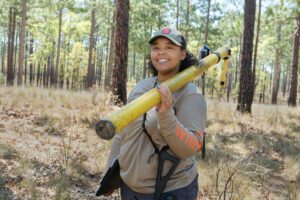
Conservation Leadership Grant: Lauren Pharr (NC State University)
Lauren Pharr aims to become a professor, mentor, and public scientist specializing in natural resources, with a focus on avian conservation and the longleaf pine ecosystem. Her current research investigates the causes of increased nestling mortality in the federally endangered Red-cockaded Woodpecker. Lauren has authored three peer-reviewed publications and delivered numerous presentations, including 15 academic talks and 22 public engagements. Her contributions to research and conservation earned her the 2023 NC Wildlife Federation’s Governor’s Conservation Achievement Award for Young Conservationist of the Year. In addition to her academic pursuits, she is an avid birdwatcher and an award-winning science communicator.
Undergraduate Scholarships
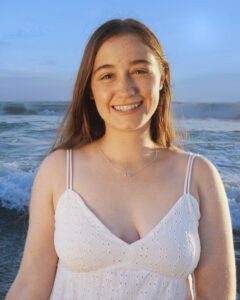
Naomi Scott (Duke University)
Naomi Scott is a dedicated marine scientist focused on conservation policy, particularly at the intersection of marine life and human communities. During the Salish Sea Sciences Field and Lab Science Research Program, she identified over twenty previously undocumented behaviors of the Sunflower Sea Star. After earning her B.S. in marine science and conservation from Duke University, she aims to address anthropogenic hazards impacting marine ecosystems. With six years of volunteer experience at the Aquarium of the Pacific, she led the Teen Climate Council and created the annual Teen Climate Fest to inspire youth action against climate change. Currently a Rachel Carson Scholar at Duke, Naomi conducts research at the Duke Marine Labs and enjoys scuba diving to explore underwater ecosystems.
Sarah Stevens (UNC Wilmington)
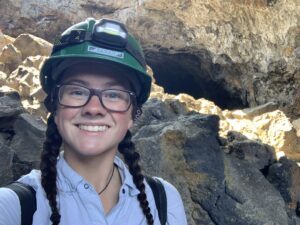
Sarah Stevens aspires to work with agencies such as the US Fish and Wildlife Service, the
Bureau of Land Management, and the National Parks Service to help promote and protect biodiversity. Before pursuing her environmental science degree, she spent a transformative gap year exploring various conservation settings, including an organic farm in Alaska and a backcountry conservation crew in Oregon. Her experiences, which included small mammal trapping and bird banding, equipped her with valuable technical skills and interpersonal abilities essential for a career in environmental science. Passionate about fieldwork, she has engaged in genetic and geospatial analyses as well as hands-on conservation efforts. In her free time, Sarah enjoys birdwatching and herping, whic
h allow her to connect with nature across diverse ecosystems.
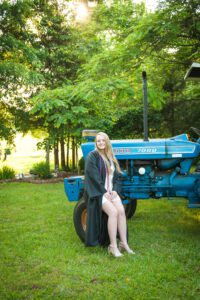
Paige Meadows (NC State University)
Paige Meadows has had a lifelong passion for wildlife, inspired by her aunt, a park ranger at Kerr Lake. She
aims to foster a love for wildlife in future generations, whether as an educator, rehabilitator, or game warden, and is committed to highlighting women’s roles in conservation. An avid hunter, Paige appreciates wildlife conservation from both ecological and population control perspectives. Currently, she works as a childcare counselor at the Piedmont Wildlife Center, where she plans and facilitates hands-on activities that promote understanding and conservation of nature. Her goal is to leave a lasting impact on aspiring wildlife conservationists.
Graduate Scholarships
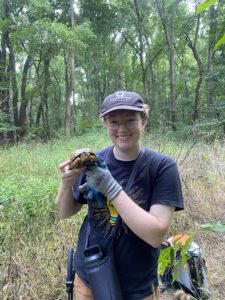
Kendal Paul (UNC Charlotte)
Kendal Paul aims to advance environmental conservation through scientific research and public education. Pursuing a Master’s degree,
she seeks to gain expertise in stream and wetland management and urban ecology, along with valuable presentation skills and professional networks. Kendal believes her practical
experiences and strong communication abilities will make her an effective scientist and educator in collaboration with those outside the natural resources field. She volunteers at a bird banding station in Raleigh, where she assists in collecting MAPS data, honing her skills in bird handling and data collection. Her ultimate goal is to contribute significant knowledge to the protection of the world’s flora and fauna for future generations.
Hannah Faye (UNC Charlotte)
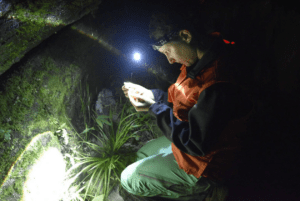 Hannah Faye is focused on molecular conservation, aiming to merge her passion for environmental preservation with an understanding of biodiversity. Her goal is to develop targeted approaches to protect endangered species and fragile ecosystems. With experience in arachnology, including nurturing over 600 spiderlings and studying glow worms, she has built a solid foundation for her career in natural resources. This work has deepened her understanding of ecological dynamics and habitat management, emphasizing the importance of creating tailored environments for various species. Hannah’s exploration of glow worm habitats has further highlighted the necessity of adaptability in conservation efforts and the critical role of habitat preservation.
Hannah Faye is focused on molecular conservation, aiming to merge her passion for environmental preservation with an understanding of biodiversity. Her goal is to develop targeted approaches to protect endangered species and fragile ecosystems. With experience in arachnology, including nurturing over 600 spiderlings and studying glow worms, she has built a solid foundation for her career in natural resources. This work has deepened her understanding of ecological dynamics and habitat management, emphasizing the importance of creating tailored environments for various species. Hannah’s exploration of glow worm habitats has further highlighted the necessity of adaptability in conservation efforts and the critical role of habitat preservation.
Written by:
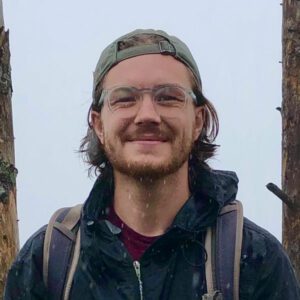
– Bates Whitaker, NCWF Communications & Marketing Manager


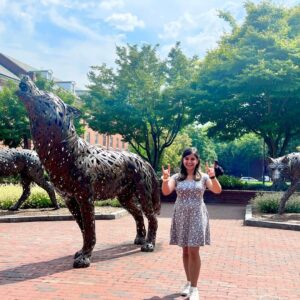 Alamance Wildlife Club Sponsored Grant:
Alamance Wildlife Club Sponsored Grant: